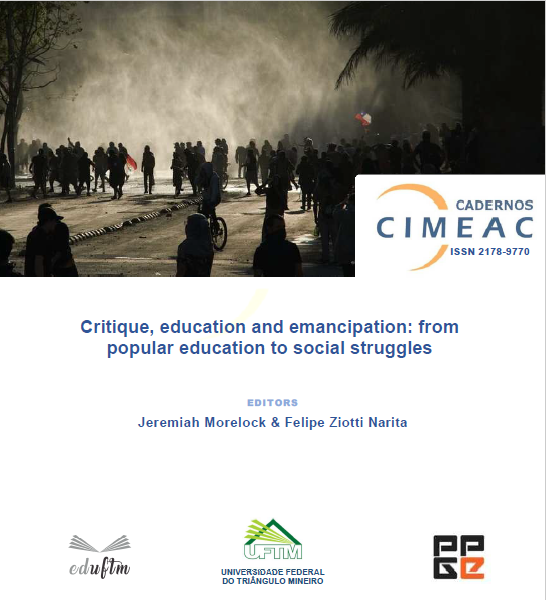Critical theory and teacher training: critique of barbarism
DOI:
https://doi.org/10.18554/cimeac.v12i3.6631Resumen
This article aims to discuss teacher training from the perspective of the Critical Theory of Society, specifically in its concept of formation (Bildung). It articulates two different planes involved in the analysis, the formation of the individual, as a theoretical concept, and professional training, as a practice, understanding that both are directly related and express the society in which they are part. It seeks to answer the question: How to think about teacher training so that the conditions that reproduce barbarism would not be maintained? To account for this purpose, an analysis of some concepts of the Critical Theory of Society were made such as formation, culture, the administered world and others. The idea of individual formation is the basis that sustained the discursive path, in which it is understood that the subjective appropriation of culture implies adaptation and resistance, occurring as an expression of the division itself between individual and society. Moreover, the administered character of culture also composes the understanding that is intended to be presented, from which the administration dominates all the areas of the life of human beings inserted in late capitalism, subduing them to commensurable rationality, prejudicial to the possibilities of resistance. Some comments will be made about the Brazilian curriculum reform, in addition to the situation of a recent pandemic, contributing to the understanding of the teaching. It is considered that the conditions increased the control and bureaucratization of activities, removing from teachers the possibility of spontaneity and autonomy. However, a discussion is made that points out that such issues have been instilled since the initial training of teachers.
Descargas
Publicado
Número
Sección
Licencia
Os autores que publicam nesta revista concordam com os seguintes termos:
(a) Não cobramos dos autores para a publicação neste periódico.
(b) Autores mantém os direitos autorais e concedem à revista o direito de primeira publicação, com o trabalho simultaneamente licenciado sob a Licença Creative Commons que permite o compartilhamento do trabalho com reconhecimento da autoria e publicação inicial nesta revista.
(c) Autores têm permissão e são estimulados a difundir e a distribuir a versão publicada de seu trabalho online (ex.: em repositórios institucionais ou na sua página pessoal) após o processo editorial, já que isso pode aumentar o impacto e a citação do trabalho publicado (Veja O Efeito do Acesso Livre).
* * *
AUTHORS COPYRIGHT AND PUBLISHING RIGHTS
Authors who publish with this journal agree to the following terms:
(a) This journal does not charge authors for publication.
(b) Authors retain copyright and grant the journal right of first publication with the work simultaneously licensed under a Creative Commons Attribution License that allows others to share the work with an acknowledgement of the work's authorship and initial publication in this journal.
(c) For authors whose articles have been accepted: authors are permitted and encouraged to post their work online (e.g., in institutional repositories or on their website) after the publication of the text in Cadernos CIMEAC, as it can lead to productive exchanges as well as earlier and greater citation of published work (See The Effect of Open Access).

 10.18554/cimeac
10.18554/cimeac

